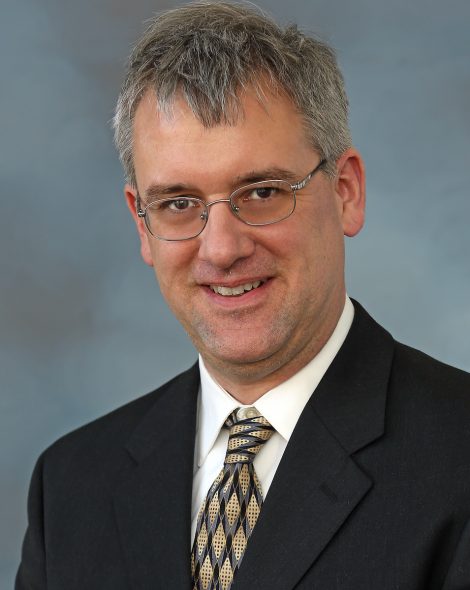Marquette University biomedical engineering professor receives $3.34 million R01 grant to study improved mobility for those with multiple sclerosis
MILWAUKEE — Dr. Brian Schmit, Hammes Family Professor in the Marquette University and Medical College of Wisconsin Joint Department of Biomedical Engineering, has received a $3.34 million R01 research grant from the National Institutes of Health to improve walking, balance and community mobility in people with multiple sclerosis.
The project, “High-intensity, dynamic-stability gait training in people with multiple sclerosis,” is funded through the National Center for Medical Rehabilitation Research of NIH’s Eunice Kennedy Shriver National Institute of Child Health and Human Development. The study will utilize a novel combination of high-intensity exercise on a treadmill that moves unexpectedly to improve balance and increase walking speed.
“There are still unmet rehabilitation needs for people with MS, and this project has the potential for substantial public health improvement,” Schmit said. “Our team will evaluate the individual and combined effects of high-intensity exercise and balance perturbations during treadmill training in people with MS. We hope this will lead to two developments. The first is to reduce falls by enhancing balance while walking, which will get better with repeated practice walking on a surface that moves unexpectedly. The second is to improve strength, coordination, and heart and lung capacity to be able to walk faster and farther.”
Previous research has shown patients with mild or moderate multiple sclerosis experience altered walking and balance control. This project’s design will look to enhance mobility in both laboratory conditions and in the real world, where walking demands are substantial, by presenting both the individual and combined effects of repeated balance perturbations during walking and high-intensity exercise.
This study is predicated on the previous experience of the investigators with high-intensity training in patients with other neurological disorders and promising results of a pilot study demonstrating feasibility of dynamic balance treadmill training in people with MS.
“I am grateful to see Dr. Schmit continue to apply his leadership and expertise to serve those living with MS,” said Dr. Kristina Ropella, Opus Dean of the Opus College of Engineering. “This interdisciplinary team’s work will improve the wellbeing and quality of life for many.”
Dr. T. George Hornby, professor of physical medicine and rehabilitation at Indiana University, is also a principal investigator on the project. He is joined by Indiana colleagues as co-investigators, Dr. David H. Mattson, professor of neurology, and Cris Henderson, research associate in applied health science. Dr. Ahmed Obeidat, associate professor of neurology at MCW, is a co-investigator, and Dr. Kelly P. Westlake, associate professor of physical therapy and rehabilitation science at the University of Maryland is a consultant on the team.
The National Institutes of Health’s Research Project Grant (R01) is the original and historically oldest grant mechanism used by the NIH. The R01 provides support for health-related research and development based on the mission of the NIH. R01s can be investigator-initiated or can be solicited.
The National Institute of Child Health and Human Development was founded in 1962 to investigate human development throughout the entire life process, with a focus on understanding disabilities and important events that occur during pregnancy.
NOTE: This press release was submitted to Urban Milwaukee and was not written by an Urban Milwaukee writer. While it is believed to be reliable, Urban Milwaukee does not guarantee its accuracy or completeness.
Mentioned in This Press Release
Recent Press Releases by Marquette University
New Marquette Law School Poll finds large majority of Wisconsin voters not yet tuned in to who is running in major 2026 elections
Oct 29th, 2025 by Marquette UniversityNo candidate has established strong position in public favorability in governor, state Supreme Court races; large majorities of voters undecided
New Marquette Law School National Survey Finds Large Majority Think Political Violence is a Big Problem, But With Sharp Partisan Differences
Oct 1st, 2025 by Marquette UniversityAmericans are overall pessimistic on reducing intense political conflict; half of those polled say heated language by leaders makes violence more likely






















